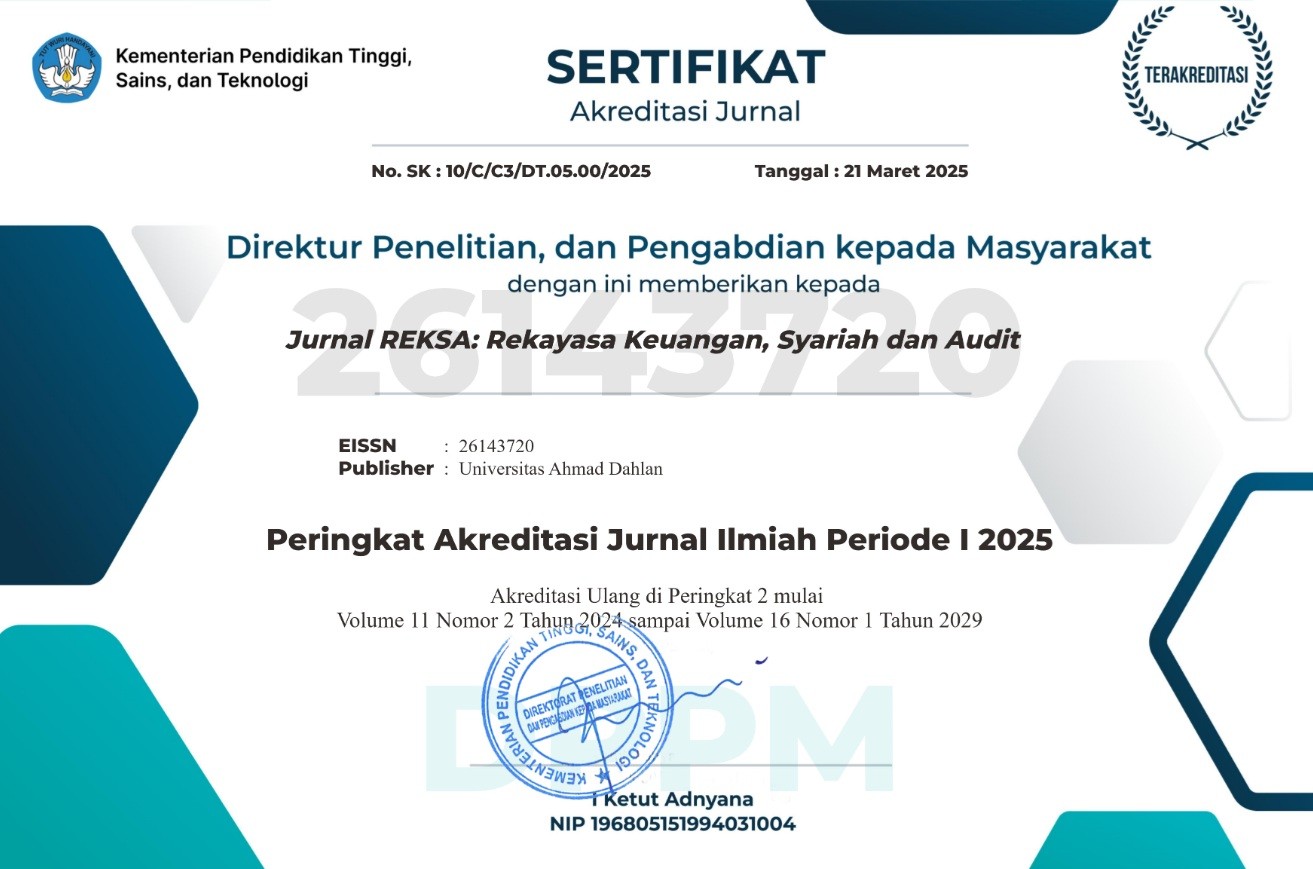Zmart: Poverty Alleviation and Women Empowerment Program Through Micro Retail Shop Business
DOI:
https://doi.org/10.12928/jreksa.v9i1.5966Keywords:
zakat, women empowerment, povertyAbstract
Zmart program is a micro retail shop empowerment program using zakat funds to alleviate poverty, especially in urban areas. This research examines the impact of Zmart program on poverty alleviation and women empowerment. The general poverty indicators based on poverty line and had kifayah standard show that the number of poverty decreases after Zmart intervention. In addition, the impact of Zmart also measured using BAZNAS Prosperity Index (BPI) with a score of 0.68, meaning Zmart has a good impact on its recipient. The Gender Development Index (GDI) in the Zmart program shows an increasing value from 75.97 to 139.32. It means that there is significant emancipation for the female group compared to the male group in the program. These results show that the Zmart program favorably empowers women as it is shown that the GDI value exceeds 100 points.
References
Andika, Aldi, & Annisa. (2020). Sudah Saatnya Integrasi Keuangan Komersial dan Sosial Syariah Diberlakukan. Komite Nasional Keuangan Syariah. https://knks.go.id/berita/247/sudah-saatnya-integrasi-keuangan-komersial-dan-sosial-syariah-diberlakukan?category=1
Badan Pusat Statistik. (2020). Booklet Survei Angkatan Kerja Nasional Agustus 2020. Badan Pusat Statistik.
Bank Indonesia. (2020). Laporan Ekonomi dan Keuangan Syariah 2019. In Bank Indonesia, Bank Sentral Republik Indonesia. https://www.bi.go.id/id/publikasi/laporan-tahunan/ekonomi-dan-keuangan-syariah/Pages/Laporan-Ekonomi-dan-Keuangan-Syariah-2019.aspx
Bappenas. (2019). Rancangan Teknokratik Rencana Pembangunan Jangka Menengah Nasional 2020 - 2024 : Indonesia Berpenghasilan Menengah - Tinggi Yang Sejahtera, Adil, dan Berkesinambungan. In Kementerian PPN/ Bappenas. https://doi.org/10.1017/CBO9781107415324.004
Beik, I. S., & Arsyianti, L. D. (2016). Measuring Zakat Impact on Poverty and Welfare Using Cibest Model. Journal of Islamic Monetary Economics and Finance, 1(2), 141–160. https://doi.org/10.21098/jimf.v1i2.524
Center of Strategic Studies BAZNAS. (2019). The Impact of Zakat Towards The Welfare of Zakat Recipient. In Center of Strategic Studies National Zakat Board (First Edit). BAZNAS.
Chapra, M. U. (2008). The Islamic Vision of Development in the Light of Maqāṣid al-Sharī`ah. IRTI-IDB.
Hilyatin, D. L. (2014). Pemberdayaan Perempuan Melalui Pendayagunaan Zakat. Jurnal Studi Islam, Gender Dan Anak, 9(2), 124–147.
Ministry of Women Empowerment and Child Protection. (2011). Policy Brief Gender Equality. Ministry of Women Empowerment and Child Protection. https://www.kemenpppa.go.id/lib/uploads/list/eec77-buku-policy-brief-gender-equality.pdf
Ministry of Women Empowerment and Child Protection. (2016). Statistik Gender Tematik: Potret Ketimpangan Gender dalam Ekonomi. In Statistics Indonesia. Ministry of Women Empowerment and Child Protection. https://www.kemenpppa.go.id/lib/uploads/list/53185-statistik-gender-tematik-2016-ketimpangan-ekonomi.pdf
Mohieldin, M., Iqbal, Z., Rostom, A., & Fu, X. (2011). The Role of Islamic Finance in Enhancing Financial Inclusion in Organization of Islamic Cooperation (OIC) Countries. The World Bank. https://doi.org/10.1596/1813-9450-5920
Morduch, J. (1998). Poverty, economic growth, and average exit time. Economics Letters, 59(3), 385–390. https://doi.org/10.1016/s0165-1765(98)00070-6
Mubarokah, I., Beik, I. S., & Irawan, T. (2018). Dampak Zakat terhadap Kemiskinan dan Kesejahteraan Mustahik (Kasus : BAZNAS Provinsi Jawa Tengah). Al-Muzara’ah, 5(1), 37–50. https://doi.org/10.29244/jam.5.1.37-50
Muthmainnah, Y. (2011, August 28). Zakat dan Pemberdayaan Perempuan. Investor.Id. https://investor.id/opinion/zakat-dan-pemberdayaan-perempuan
Nurzaman, M. S. (2016). Evaluating the Impact of Productive Based Zakat In the Perspective of Human Development Index : A Comparative Analysis. Kyoto Bulletin of Islamic Area Studies, 9(March), 42–62. https://doi.org/10.14989/210347
Purwakananta, A. (2018). Zakat di Era Disruptif. Presented in Zakat Wakaf Goes To Campus Universitas Indonesia 24 September 2018.
Qaradawi, Y. (1999). A Comparative Study : The Rules, Regulations and Philosophy of Zakat in The Light of The Qurʼan and Sunna. Dar Al Taqwa.
Sriharini, & Moh Abu Suhud. (2017). Warung Beres Sebagai Modal Sosial Meningkatkan Produktifitas Ekonomi Umat. Jurnal Pemberdayaan Masyarakat: Media Pemikiran Dan Dakwah Pembangunan, 1(1), 119. https://doi.org/10.14421/jpm.2017.011-06
Susanti, S. O. (2013). Inovasi Pelayanan Publik Elektronik Warung Gotong Royong Kelompok Usaha Bersama Program Keluarga Harapan (E-Warong KUBE PKH) sebagai Upaya Pemberantasan Kemiskinan (Studi pada Dinas Sosial Kota Malang). In Universitas Muhammadiyah Malang. Universitas Muhammadiyah Malang.
World Economic Forum. (2021). Global Gender Gap Report (Issue March). http://www3.weforum.org/docs/WEF_GGGR_2021.pdf
Zayas, F. G. de. (1960). The Law and Philosophy of Zakat. Al-Jadidah Printing Press.
Downloads
Published
How to Cite
Issue
Section
License
Copyright (c) 2022 Randi Swandaru, Priyesta Rizkiningsih, Deden Kuswanda

This work is licensed under a Creative Commons Attribution-ShareAlike 4.0 International License.
- Authors retain copyright and grant the JURNAL REKSA right of first publication with the work simultaneously licensed under a Creative Commons Attribution License (CC BY-SA 4.0) that allows others to share (copy and redistribute the material in any medium or format) and adapt (remix, transform, and build upon the material) the work for any purpose, even commercially with an acknowledgment of the work's authorship and initial publication in JURNAL REKSA.
- Authors are able to enter into separate, additional contractual arrangements for the non-exclusive distribution of the journal's published version of the work (e.g., post it to an institutional repository or publish it in a book), with an acknowledgment of its initial publication in JURNAL REKSA.
- Authors are permitted and encouraged to post their work online (e.g., in institutional repositories or on their website) prior to and during the submission process, as it can lead to productive exchanges, as well as earlier and greater citation of published work (See The Effect of Open Access).




